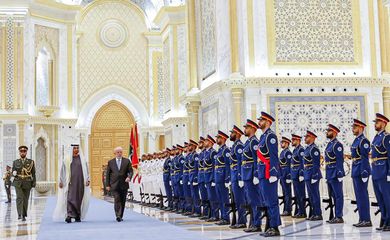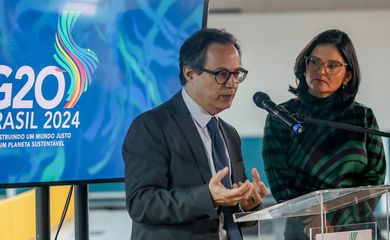UN reform: one of Brazil's priorities at G20 meeting

Israel and Palestine, Russia and Ukraine, armed conflicts in Somalia, Sudan, Nigeria, and Syria. Different parts of the world are seeing a rise in political instability, military spending, and in the number of casualties. As the G20 Foreign Ministers' Meeting approaches on February 21 and 22 in Rio de Janeiro, Brazil's priority is to discuss ways of reforming and strengthening the United Nations (UN).

During a press conference on Tuesday (Feb. 20), Mauricio Carvalho Lyrio, Brazil's G20 Sherpa and Secretary for Economic and Financial Affairs at the Ministry of Foreign Affairs, emphasized the urgent need to restructure global governance and ensure the availability of peace-building mechanisms.
"We are putting out fires. With 183 conflicts ongoing worldwide, the humanitarian rights situation has reached a catastrophic level, requiring structural action," stated the ambassador. "Our goal is to achieve a meaningful reform of the UN, transforming it into an effective instrument for conflict prevention."
"Some countries advocate for reforming the Security Council, while others propose empowering the General Assembly or strengthening the Economic and Social Council. Brazil has consistently supported comprehensive reform. The UN must become more representative and responsive to contemporary needs," he added.
G20 meetings
Brazil assumed the rotating presidency of the G20 on December 1, 2023, and will continue in this role until November 30, 2024. Throughout this period, approximately 130 meetings are anticipated to be held in 15 cities nationwide. Among these gatherings, the most significant is slated to be the G20 Summit of Heads of State and Government, scheduled for November 18 and 19 in Rio de Janeiro.
The meetings on Wednesday and Thursday will be attended by representatives of all G20 member countries, including Argentina, Australia, Canada, China, France, Germany, India, Indonesia, Italy, Japan, Mexico, Russia, Saudi Arabia, South Africa, South Korea, the United Kingdom, and the United States. Additionally, representatives from the African Union and the European Union will also be present.
Brazil has extended invitations to 12 additional countries and representatives from various organizations, including the UN and development banks such as the World Bank and the New Development Bank (NDB), to participate in the meeting of foreign ministers in Rio de Janeiro.
According to the Brazilian Ministry of Foreign Affairs, the discussions throughout the year will be structured around three priorities: enhancing social inclusion and combating hunger and poverty; promoting sustainable development, with a focus on its three pillars: social, economic, and environmental aspects; and reforming global governance institutions.





